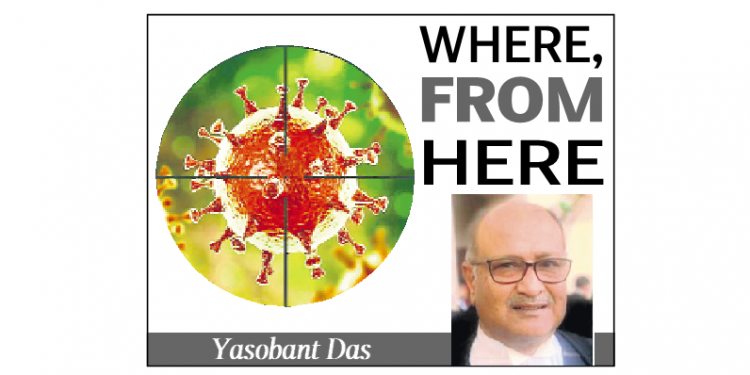Prominent individuals participating in this continuing series here visualize how things will be in the post-Covid and post-lockdown scenario —EDITOR
Social distancing or lockdowns as a means of fighting a pandemic can never be an answer in Indian conditions. The reasons are many, but mainly our cities are thickly populated and several areas inhabited by the urban poor are largely congested. At the same time, is it prudent to allow all activities of community earning, irrespective of whether or not they involve a vendor in the street or an industrial worker in a factory or an agricultural worker in his field? It’s too complex in the Indian ethos to have a straightjacket answer to such a complex problem.
The blue collar workers, more specifically in the software industry, have been more productive, working from home than at their workplace. Developed countries like Germany have already accepted this model. Mall-trekking will substantially reduce and the shopaholic will rather do his window-shopping on his laptop or iPad.
All these luxuries are, anyway, a distant dream for a majority of the Indian population. The vegetable cart puller or the vendor on a bicycle meandering through the small lanes is a good example of the digitization-linked purchases not reaching the wider population in any major way.
The virtual education already introduced in many high-end schools may have to percolate down to government schools and reach inaccessible villages and the urban poor, this being a necessity now. Subsidy to buy electronic gadgets that are necessary for this to the weaker sections of the society must be seriously thought of.
How the economy would react when we limp back to the new normalcy will be beyond economists’ perception or theory. It will take a shape unknown to us. There could be a major paradigm shift in the priorities of the middle class’ spending habits. In short, life has to go on irrespective of whether a virus is on the prowl or not.
Litigation as a profession is definitely in the non-priority sector; and the highest amount of litigations so far were against the government for its inaction or illegal actions. The Orissa High Court had, on May 5, extended all interim orders, bails, anticipatory bails etc and stayed all evictions and demolitions till June 18, which gives the people some relief. It’s time the government addressed its duties in any sphere, whether it be the Civil Service law, entering into a contract with the general public and/or the criminal jurisprudence. This will reduce the workload on the courts. Demand for justice made to the executive pre-litigation, which is otherwise referred to as representation of the aggrieved person with the executive, should be dealt with judiciously. This may entail the government to utilize their law officers and their law department to seriously look into these representations so that scope for litigation is reduced and unnecessary financial burden on both state and litigant avoided.
I am an eternal optimist who believes that there’s no problem without a solution and the tunnel, however long, shall open into the brightness at the end. Elementary civic discipline should be inculcated in the social milieu from an early age so that there’s a lateral consciousness of basic hygiene. Public health and participation of private sector in medical research should be encouraged. A relook at the budgetary allocations to the public health sector should be a priority both for the federal government and the states.
The writer is a Designated Senior Advocate practising in the Supreme Court.






































